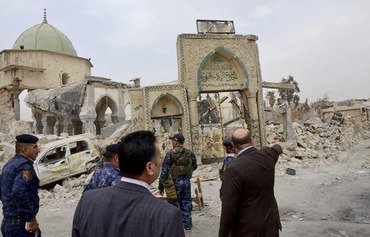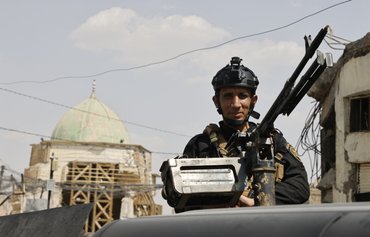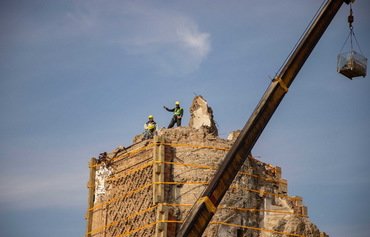Work began at the end of April on phase one of the reconstruction campaign of the Aghawat historical mosque in the heart of the Old City of Mosul.
The mosque, one of dozens that were damaged in the war on the "Islamic State of Iraq and Syria" (ISIS), dates back to the 18th century and is situated beside the historical bridge over the Tigris river.
The Iraqi government is working jointly with UNESCO, with funding from donor countries, in an effort to bring heritage sites in Mosul back to life.
The first stage of the Aghawat reconstruction plan, which is funded by Germany, involves clearing the rubble and unexploded ordnance from the complex as well as securing the project site for reconstruction.
![Iraqi officials check on the progress of reconstruction work being performed on historical mosques in Mosul on March 9th. [Photo courtesy of the Sunni Endowment Bureau in Ninawa]](/cnmi_di/images/2020/05/22/24086-iraqi-officials-aghawat-600_384.jpg)
Iraqi officials check on the progress of reconstruction work being performed on historical mosques in Mosul on March 9th. [Photo courtesy of the Sunni Endowment Bureau in Ninawa]
The restoration of the mosque will require taking an inventory of the damage and the surviving historical architectural element of the mosque complex, UNESCO said.
In conjunction with this work, UNESCO will train local experts on restoration techniques through a skill building programme that will also provide job opportunities for young talent in Mosul.
'Reviving the spirit of Mosul'
The restoration of Aghawat mosque follows other efforts undertaken by the Sunni Endowment Bureau in Ninawa and UNESCO to rehabilitate the Grand al-Nuri Mosque and its al-Hadba minaret with $50 million in funding from the UAE.
All these restorative efforts fall under UNESCO's "Reviving the spirit of Mosul" initiative, said Abu Bakr Kanaan, director of the Sunni Endowment Bureau in Ninawa.
This initiative was launched by UNESCO two years ago to rebuild historical landmarks and places of worship that symbolise the cultural identity of the people of Mosul, which is steeped in history.
"There are no less that 27 historical mosques throughout Ninawa that were damaged by ISIS when the province was under their control and during the liberation battles," Kanaan said.
"Some of these sites were not heavily damaged and have since been restored, such as the historical al-Pasha Mosque in the Old City, al-Imam al-Bahir Mosque and al-Imam al-Hussain Mosque," he said.
Others such as the Grand Mosque of Mosul in the agricultural district are in the process of being restored, he added.
Sheikh Salah al-Obeidi, who heads the Muslim Scholars Forum of Mosul, shines a light on the history of the Aghawat mosque and its importance to the people of Mosul.
The mosque "is a historical Mosul landmark as it was built at the start of the 18th century by the [venerable] al-Aghawat family" who ruled Mosul until the start of the 19th century, he told Diyaruna.
"The mosque is located at the centre of the Old City's souk [bazaar] and is considered a popular destination for local craftsmen and residents," he said.
Symbol of Mosul's identity
"The mosque also has scientific and intellectual significance as religious seminars and discussions and Koranic studies and jurisprudence, Hadith and linguistics were all taught there," he said.
Renowned religious scholars have a history of teaching at the Aghawat mosque, such as the late Sheikh Abdullah al-Nimeh, Sheikh Rashid Afandi al-Khatib and Sheikh Mohammed bin Yasin al-Mosuli, according to al-Obeidi.
"This and other old mosques deserve all the care and attention from us and they should be restored to their former glory because they occupy not only a religious significance in our collective memory, but also one of a cultural and humanitarian nature," he said.
Aghawat is a "prominent symbol of the city's identity, which is known for its religious pluralism and its values of tolerance, moderation, co-existence and openness to the other", he added.
Old City resident Mahmoud Khalil, 54, said, the Aghawat mosque "has a special place in the hearts of Mosul's residents".
"This and other mosques like it are linked with our identity and history and are a part of our lives," he told Diyaruna. "When the call to prayer is announced, we would go there to pray and perform our religious rituals in an atmosphere of faith and peace."
"We hope this mosque is rehabilitated as soon as possible and that all the landmarks of our city are restored."

![Work has started on phase one of the reconstruction of the historical Aghawat mosque in Mosul. [UNESCO]](/cnmi_di/images/2020/05/22/24085-aghawat-mosque-mosul-600_384.jpg)






